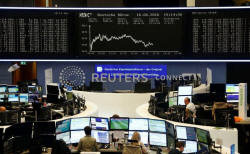Stocks wilt as bond markets flash recession warnings
 Send a link to a friend
Send a link to a friend
 [August 14, 2019] By
Tom Wilson [August 14, 2019] By
Tom Wilson
LONDON (Reuters) - Stock markets slumped on
Wednesday as Germany's economy went into reverse, fuelling fears of
global recession and slamming the brakes on a rally for equities after
Washington delayed tariffs on some Chinese imports.
Europe's biggest economy shrank 0.1% in the second quarter as the trade
war and weak demand dragged on German manufacturers. The euro zone as a
whole barely grew in the same quarter, with the 19-country bloc adding
0.2% - a slowdown from the first three months of the year.
The Euro STOXX 600 <.STOXX> fell 1%. Markets in London <.FTSE>,
Frankfurt <.GDAXI> and Paris <FCHI> lost between 0.8% and 1.5%. Wall
Street futures gauges were also indicating losses of around 0.7%.
The MSCI world equity index <.MIWD00000PUS>, which tracks shares in 47
countries, lost 0.2%, surrendering by late morning its earlier gains.
Bond markets, too, were flashing warning signals of recession.

The gap between U.S. two-year and 10-year Treasury yields - a metric
closely watched for signs of a slowdown - inverted for the first time
since 2007, raising the specter of a global recession.
(GRAPHIC - Bonds: https://tmsnrt.rs/2YN5XYj)
"The telling thing is that there is a delayed effect - traditionally you
see a one-to-two-year lag before a recession. You could see it next
year," said Neil Wilson, chief markets analyst at Markets.com.
"The fact that 2s10s has also gone this way is a massive red warning
light for the U.S. economy," he said, referring to the inverted yield of
U.S. Treasuries.
The gap between UK two- and 10-year bonds also inverted for the first
time in over a decade, while U.S. 30-year bonds and German 10-year bunds
fell to record lows.
The German figures - along with data showing the slowest growth for
Chinese industrial output in 17 years that indicated faltering demand in
the world's second-largest economy - knocked the wind out the sails for
stocks and gave rise to the angst over a slowdown.
Equity investors on Wall Street and in Asia had cheered earlier when
U.S. President Donald Trump pushed back to December a Sept. 1 deadline
for new tariffs on remaining Chinese imports.

[to top of second column] |

Traders sit at their desks in front of the DAX board at the
Frankfurt stock exchange, Germany June 16, 2016. REUTERS/Ralph
Orlowski

The S&P 500 <.SPX>, which had fallen 1% on Monday, rose 1.5% overnight, buoying
Asian stocks outside Japan <.MIAPJ0000PUS> by 0.5%. Benchmarks in Shanghai, Hong
Kong, Tokyo and Seoul all mirrored the surge in U.S. stocks.
But the momentum ebbed in Europe, as optimism faded that Trump's move meant
tensions were easing and Germany's slowdown showed the damage already done by
the trade war.
"The trade war and the dispute between U.S. and China has already had an impact
- especially when you look at countries most sensitive to global trade like
Germany and even Italy," said Christophe Barraud, chief economist and strategist
at Market Securities in Paris.
In another sign the trade dispute is hampering growth, China's industrial output
slowed more than expected in July. Its 4.8% growth was the lowest since February
2002.
The Japanese yen <JPY=EBS>, considered a safe haven, gained 0.6% to 106.13 per
dollar, as the Chinese data underscored the effects of the trade war on the
powerhouse economy.
Mirroring that view, the offshore Chinese yuan <CNH=EBS> fell 0.4% against the
dollar to 7.0337, erasing gains made the day before and remaining weaker than
the 7 to the dollar it reached last week.
(GRAPHIC - China industrial output: https://tmsnrt.rs/2YOpAiC)

In commodity markets, oil prices fell after the Chinese data from China and a
rise in U.S. crude inventories, erasing some of the gains made after Trump's
tariff delay.
Brent crude <LCOc1> was down 80 cents, or 1.4%, at $60.47 a barrel at 1053 GMT,
after rising 4.7% on Tuesday, its biggest percentage gain since December.
For Reuters Live Markets blog on European and UK stock markets, please click on:
[LIVE/]
(Reporting by Tom Wilson; Editing by Mark Heinrich)
[© 2019 Thomson Reuters. All rights
reserved.] Copyright 2019 Reuters. All rights reserved. This material may not be published,
broadcast, rewritten or redistributed.
Thompson Reuters is solely responsible for this content. |